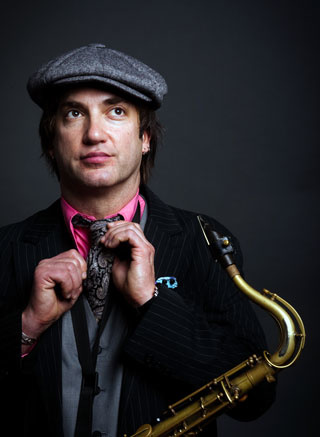Influential multi-instrumentalist and composer Peter Apfelbaum, founder of the Hieroglyphics Ensemble, will be a special guest soloist in a free concert by the University of Iowa's Johnson County Landmark big band at 7:30 p.m. Friday, April 13, in the Englert Theater. The concert by the School of Music's top big band will also feature several faculty soloists.

Apfelbaum formed the 17-piece Hieroglyphics Ensemble in 1977 as a vehicle for composing and exploring nontraditional musical forms, and the group soon began to attract international attention for their unique mix of elements of world music with the aesthetica approach of the jazz avant-garde.
Over the years Apfelbaum and his ensemble have been associated with prominent jazz and world-music artists including Joshua Redman, Carla Bley, Don Cherry, Lee Konitz, Jai Uttal, Trilok Gurtu, Cecil Taylor, Levon Helm, Charlie Hunter, and the Grateful Dead. In 1991 he won the Grateful Dead's annual Rex Foundation Award for Creative Excellence.
In recent years he has toured the United States and Europe and recorded with his ensemble and numerous other artists, including four sold-out tours with Phish guitarist Trey Anastasio's band, and he arranged and composed music for Harry Belafonte's 2003 European tour.
Apfelbaum has stated: "I feel that one thing I have in common with others in my generation, like Steven Bernstein's Sex Mob, Graham Haynes, Josh Roseman, Charlie Hunter, Will Bernard, and Medeski, Martin and Wood is that we see the dance music of our time (or "groove" music, as MMW calls it) as having potential for creative development.
"At no point in the process of composing have I made a conscious decision to incorporate African elements or, for that matter, any other cultural or stylistic elements. I just write and build and adjust the shape of it all. My vocabulary reflects the fact that I started life as a drummer and was trained as a sub-teenager in jazz theory, blues, gospel music. As a teenager I was inundated with jazz, African and Latin music, was involved in group improvisation on a regular basis, listened to a lot of 20th-century classical music, worked in R&B, reggae, blues, Latin, African, Jazz, funk, Middle Eastern and Indian bands, and for as long as I can remember, have been fascinated by how sounds fit together."
Volume two of The Essential Jazz Records said of his Signs of Life recording, "At the threshold of the new millennium, Signs of Life appeared as one of the finest recordings since the jazz-rock revolution at the end of the 1960s by showing the potential of jazz to reinvent itself in a cogent, unified and original way. His music sounded like a peek into a multicultural world beyond our own that somehow made so much jazz of the 1970s, 1980s and 1990s sound dated. Perhaps more important, it revealed not only a compelling vision of jazz in the present, but with the onset of the millennium, what jazz might yet become."
JCL is part of the UI School of Music in the College of Liberal Arts and Sciences.
For more information or special accommodations to attend, contact John Rapson at 319-335-1662 or ira-rapson@uiowa.edu